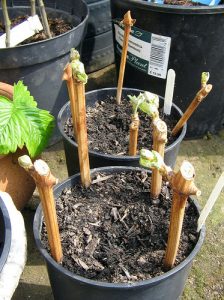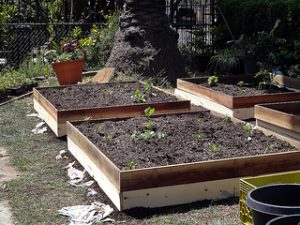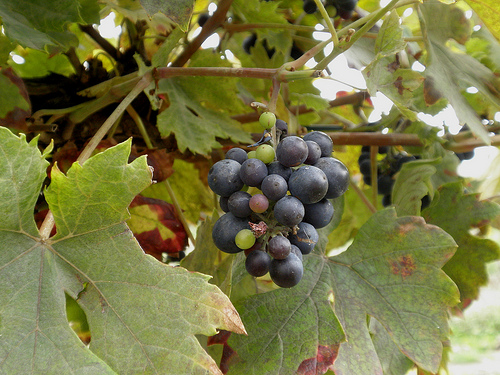Fifth Sunday of Easter, Year B
May 6, 2012
My father is glorified by this, that you bear much fruit and become my disciples. — John 15:8
Looking to preach a stewardship sermon this week? No? Why not? The lessons offer fertile soil to plant the seeds of discipleship and to enrich and deepen the roots of disciples long planted. If you want to reap the fruits of generosity and thankfulness, dear friends, you must cultivate and tend to the entire plant on a regular basis.
I’m afraid too many busy church folk still relegate stewardship to the far corner of some library shelf, only to be brought down, dusted off, and gussied up for the fall pledge drive. The expectation is that people will give because they are asked and because it is the church asking. Some will. Unfortunately, as these generous post-World War II saints pass into eternity, the pool of conditioned regular givers is shrinking. Those who are replacing them in our faith communities come with different expectations and experiences about their time, money, and possessions. It isn’t that these present-day faithful are not generous; they simply are products of a different age and culture. I am convinced that all people possess the basic “hardwiring” to care and share; however, the church and those who lead it must invest serious time and energy to educate and form generous disciples.
 Enough of the obvious; let’s think about how these lessons can turn the heart’s soil and fertilize the seeds of faith and love that were sown in baptism. The gospel lesson gets right to the heart of the matter: disciples must be connected to Jesus in order to grow, thrive, and produce fruit. Anyone who has ever gardened, worked with flowers, or tended grape vines can understand this principle. Without the direct connection to the tap root, life ebbs, the branch withers and dies.
Enough of the obvious; let’s think about how these lessons can turn the heart’s soil and fertilize the seeds of faith and love that were sown in baptism. The gospel lesson gets right to the heart of the matter: disciples must be connected to Jesus in order to grow, thrive, and produce fruit. Anyone who has ever gardened, worked with flowers, or tended grape vines can understand this principle. Without the direct connection to the tap root, life ebbs, the branch withers and dies.
As the Church, the Body of Christ, we are branches connected to the vine. If we are to flourish, we must tap into the life source that is Jesus and we must draw strength and connection from one another. Things tend not to happen overnight in communities of faith; one doesn’t go straight from bud break to harvest. It is an organic process, not a program or a package or an event. We are called share life together, devote time to disciple-making, and actively engage in ministry and mission. Stewardship is integral to every phase of the process that allows us learn, we grow, we tell, and we share.
Why not take advantage of this day to activate the process and allow the Spirit to help percolate the people of God? We learn in the story of Philip and the Ethiopian (Acts 8:26-40) that mentoring and teaching are necessary for growth. The lesson from 1 John (4:7-21) reminds us that love springs from the taproot of God, filling our branches and flowering into fullness. Opportunity abounds to proclaim the centrality of stewardship to the life of discipleship.
 When asked if he understood what he was reading, the Ethiopian replies (Acts 8:31) “How can I, unless someone guides me?” In like manner, how can the Body of Christ understand stewardship of all life unless others serve as guides? Start now–this very Sunday–to cultivate generosity, fertilize with hope and joy, and water generously with love of God and neighbor. Let everything you say and do remind the people of God’s abundance and our call to participate in it. Don’t just ask for money; ask for their very lives by guiding them to become stewards of every decision and each moment, of all that God has given them. Generosity motivated by love and understanding is the real deal; it goes way beyond the simple passing of the plate. Don’t wait until next fall or until you find the perfect program or the right chair for the stewardship committee; begin now and draw deeply from the vine–our Lord and Savior Jesus the Christ.
When asked if he understood what he was reading, the Ethiopian replies (Acts 8:31) “How can I, unless someone guides me?” In like manner, how can the Body of Christ understand stewardship of all life unless others serve as guides? Start now–this very Sunday–to cultivate generosity, fertilize with hope and joy, and water generously with love of God and neighbor. Let everything you say and do remind the people of God’s abundance and our call to participate in it. Don’t just ask for money; ask for their very lives by guiding them to become stewards of every decision and each moment, of all that God has given them. Generosity motivated by love and understanding is the real deal; it goes way beyond the simple passing of the plate. Don’t wait until next fall or until you find the perfect program or the right chair for the stewardship committee; begin now and draw deeply from the vine–our Lord and Savior Jesus the Christ.
Blessings on your fearless proclamation and teaching. Remember, you are connected to the life source and that is what counts.
Visual
No experience with grapes? Click here for a detailed video of how to plant and grow grapes. Here’s a longer video clip (almost 15 minutes) about grape growing and organic farming at the Kendall-Jackson Winery.
With Youth
 How about starting a community garden for your congregation? This is a great way to involve your youth group, teach an important skill, and encourage generosity and sharing. Let the youth group lead the effort and involve all ages in the process. Don’t have land for a garden? Start small! Do some container gardening or experiment with window hydroponics. If your town or city already has a garden, consider working a plot in it. You’ll meet your neighbors, give your faith community visibility, and grow plenty of good produce to share. Click here for a video that tells the story of how the Seeds of Faith Community got its start at First Christian Church in Lansing, Michigan.
How about starting a community garden for your congregation? This is a great way to involve your youth group, teach an important skill, and encourage generosity and sharing. Let the youth group lead the effort and involve all ages in the process. Don’t have land for a garden? Start small! Do some container gardening or experiment with window hydroponics. If your town or city already has a garden, consider working a plot in it. You’ll meet your neighbors, give your faith community visibility, and grow plenty of good produce to share. Click here for a video that tells the story of how the Seeds of Faith Community got its start at First Christian Church in Lansing, Michigan.
With Children
Help children understand Jesus’ metaphor of the vine and branches using an interactive visual. Designate one person to be “the vine” (perhaps a parent, older youth, or willing pastor). Tie brown twine or yarn (one strand for each child) around the vine’s arms. Tie (lightly so that you can easily untie them) the other end of each piece of twine or yarn to a child so that all are connected to “the vine.” As you are doing this, tell the story of why it is important for us to be connected to Jesus relating it to how plants grow. At the end give each child a green paper leaf with John 15:8 printed on it, telling them that it is time for them to go and spread the good news. Untie them one by one and offer a prayer of blessing and sending.
If you want to extend the metaphor or are using this lesson in a children’s church or Sunday school setting, consider helping the children plant flower seedlings in small pots they decorate. Encourage children to tend the plants and then give them to someone as a gift to show God’s love.
Photos by Amanda B. Slater, Mark Shirley, and Craig Dietrich used under Creative Commons License. Thanks!




Leave a Reply